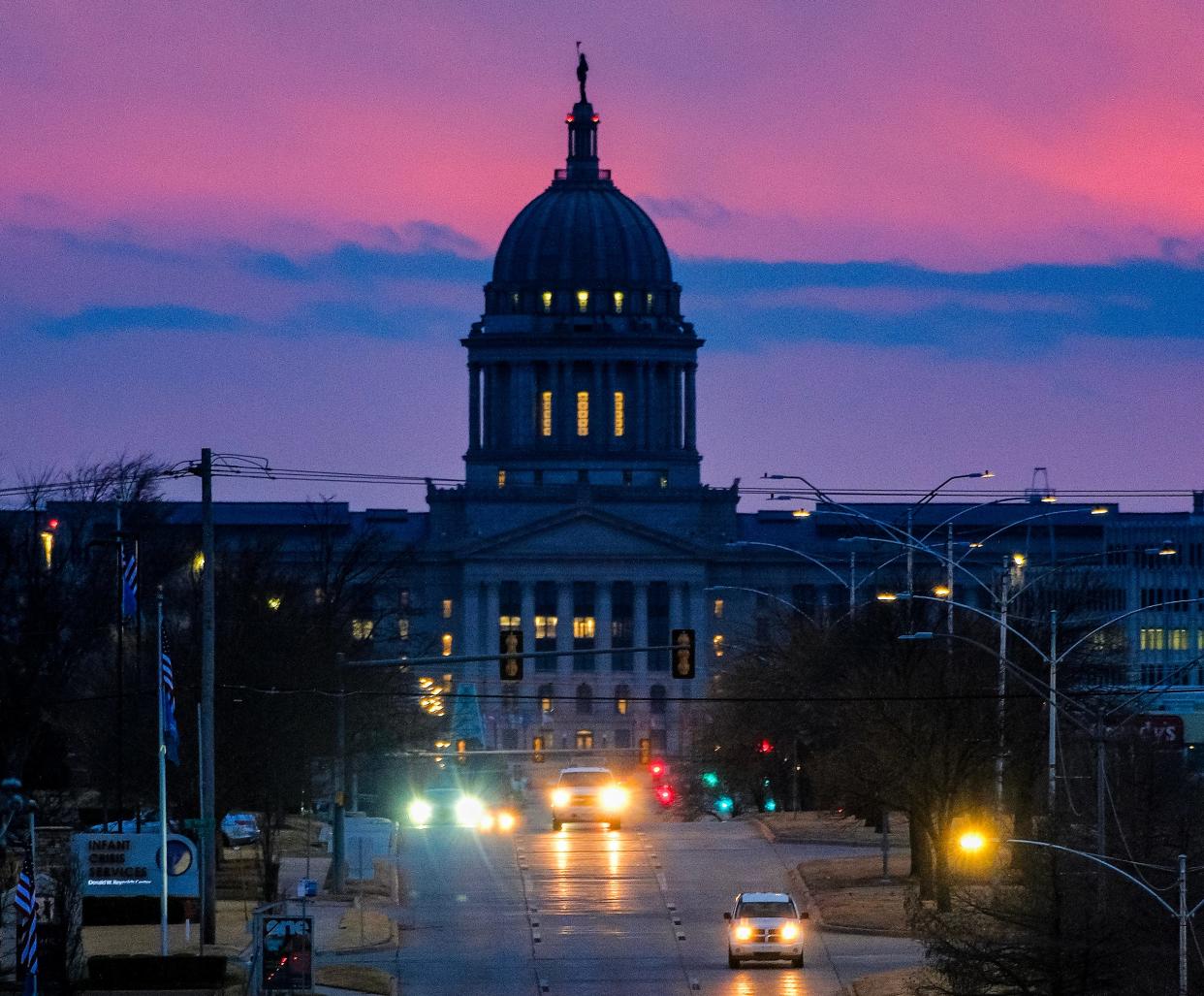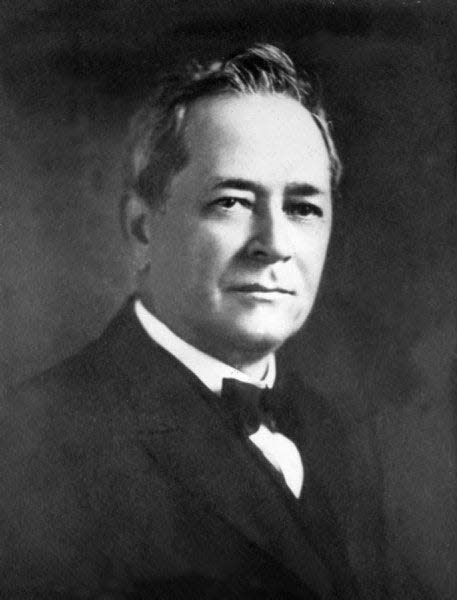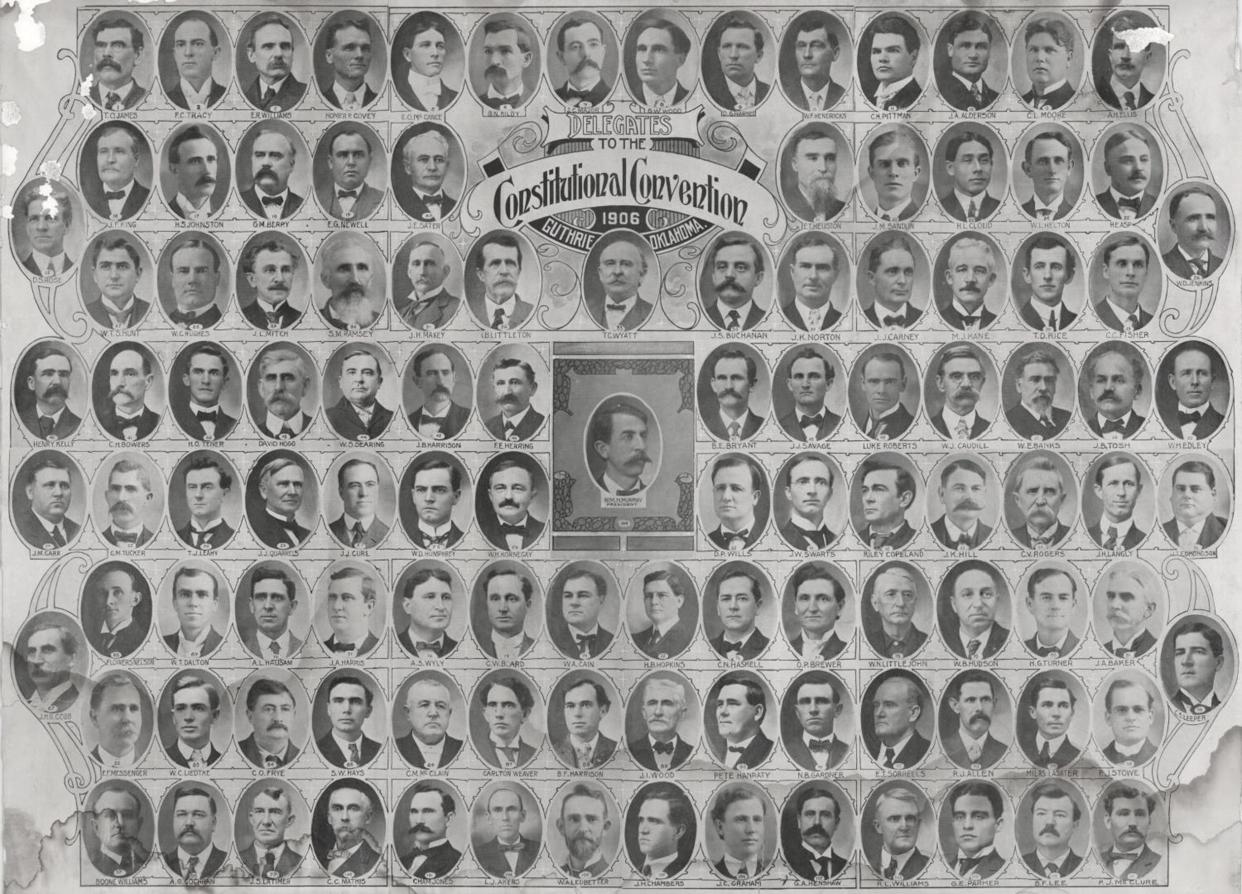Why does one legislator have a quest to protect Oklahoma's initiative and referendum law?

Oklahoma's Constitution — that large, wordy document that merged Oklahoma Territory and the proposed State of Sequoyah into a single entity — has always given the Legislature more power than the governor. With that clout, the Oklahoma Legislature has, for more than 100 years, pretty much run the show.
But there's a catch.
Even with its strong legislative bodies, the Sooner State's Constitution included a workaround — just in case elected officials strayed too far from the the people — it's the Constitution's initiative and referendum clause.
The Oklahoma Constitution spells it out pretty clearly: "All political power is inherent in the people ... and they have the right to alter or reform the same whenever the public good may require it."
For more than a century, the public has used the initiative and referendum process to change state law and the Constitution itself. Indeed, records show the Oklahoma Constitution — has been amended by the public more than 150 times.
But not everyone embraces public-driven legislation.
Oklahoma legislators have been trying to make ballot initiatives more difficult to pass
This year several lawmakers in Oklahoma, like those in other states, are proposing laws to make it harder for the people to take advantage of the initiative and referendum process. The effort isn't new. For several years, many state lawmakers have sought to make it more difficult to develop and pass ballot initiatives.
This spring, state Sen. Julie Daniels, a Bartlesville Republican, authored Senate Bill 518. That measure, which cleared the Senate Judiciary Committee on an 8-3 vote would have dramatically changed the initiative and referendum process.
The measure would require additional paperwork for a petition, would increase the amount of time for protests or objections, require more personal information from those who file a petition and assess a $750 filing fee, which, Daniels said, would help defray administrative costs.
Daniels said the changes would increase voter interest.
“Tightening up the process at the front end yields a better product on the back end when we go to the polls,” Daniels told the committee. “It’s not as difficult to get on the ballot in Oklahoma as it is in other states. I just want to make sure our process is above board when citizens do take part in the initiative petition process."
More: How a petition filed in secrecy helped move Oklahoma's capital from Guthrie to OKC
State Rep. Mickey Dollens isn't buying that argument.
Dollens, an Oklahoma City Democrat, is leading an effort to make sure proposed changes like Daniels' don't happen. He recently chaired an interim study commission that looked at the ways other lawmakers were trying to clamp down on the ballot initiative process. Dollens is concerned that more attempts will be made to tighten the rules on ballot initiatives during the 2024 legislative session.
"I want to expose some of the tactics — not only in Oklahoma, but across the country — to undermine the ballot initiative process," he said.

Dollens is pushing back against several resolutions filed by Republicans during the spring legislative session that would have tightened the requirements on the initiative and referendum process and made it more difficult to pass a state question.
The resolutions included:
● Raising the number of votes from a simple majority to 66% for petitions to pass.
● Limiting state questions to odd-numbered years.
● Requiring signatures on initiative petitions from every county in the state.
● Requiring a 60% threshold for passage of state questions that increased government spending.
These proposals were just the latest in a long line of attempts to change the initiative and referendum process ― a process that has a long, storied history in Oklahoma.
Written into the 1907 state Constitution and largely modeled after Oregon’s initiative and referendum law, Oklahoma's initiative and referendum clause has sparked more than 800 initiative petitions since statehood. Many of those state questions were referred to voters through the Legislature, while others sprouted from the grassroots.
A vast majority of the state's initiative petitions were generated at the local level. To achieve this, supporters circulate a petition that spells out the state question and if the required number of signatures are collected — 15% of the legal, registered voters to amend the Constitution and 8% to propose a state law ― then the question is sent for a public vote.
More: Would Oklahoma voters approve an increase in the state's $7.25 minimum wage?
Oklahoma's process also includes a 10-day protest period, limits the amount of time signatures can be gathered and allows the attorney general to review a proposed ballot title. Once the petition clears all the legal hoops — and provided it has the proper number of signatures ― it is set for a public vote by the governor. State law allows the governor to choose the date for the vote.
Still, not all of those initiative petitions make it to a vote. Many are abandoned after filing and others are filed but don't get enough signatures. Some have been thrown out by the Oklahoma Supreme Court.
A small number are adopted — but each initiative petition serves as a reflection of the politics at a particular moment in time.
Records show that since statehood, Oklahomans have cast ballots on more than 400 state questions. Some of those proposals caused dramatic changes in state government. Others, however, weren't the best of ideas.
Voting rights, tax increases and marijuana have appeared on Oklahoma ballots
Written in 1915, State Question No. 79 would have given women the right to vote. Though the proposal, developed during the height of the suffrage movement, won the approval of the state House of Representatives, it was derailed by the Oklahoma Senate.
“It failed for two reasons,” historian Robert Darcy of Oklahoma State University wrote. “First, it passed the House February 12 and the session was over February 22. There was little time for Senate action. Second, the Legislature was taken up with another suffrage amendment, a literacy test."
Darcy wrote that taking away Black voters' rights was a higher priority for the Legislature than extending the vote to women.
Literacy tests in any state were outlawed as part of the Voting Rights Act in 1965.
Decades later, in 1990, after the Legislature passed a massive education reform and tax increase package, voters adopted State Question 640 which limited lawmakers' ability to raise taxes. State Question 640 — which passed on a 373,143 to 290,978 vote — prevented tax increase legislation in the last five days of the Legislature, required that any tax increase be submitted to a public vote or win the approval of 75% of the members of both Houses of the Oklahoma Legislature.
Seven years ago, voters passed two state questions. State Question 780 dramatically changed Oklahoma's criminal justice system and made many drug offenses misdemeanors. State Question 781 created the County Community Safety Investment Fund.
Two years later, State Question 788 legalized medical marijuana by a vote of 507,582 to 385,176.
From 2018 through last year, 13 different initiative petitions and at least two state questions have addressed marijuana and its use in Oklahoma. In February, State Question 820, which would have legalized the recreational use of marijuana in the state was shot down by voters with 349,284 no votes against only 217,078 in favor of the measure.
The Grandfather Clause and other bad ideas
Other proposals took a less-than-noble approach to state government. Some were downright racist. The "Grandfather Clause," for example. That amendment, an attempt to disenfranchise Black Americans, was added to the Oklahoma Constitution just a few years after statehood in 1910 only to be later declared unconstitutional by the U.S. Supreme Court.

Other petitions never got off the ground:
Initiative Petition No. 15, filed in September 1911, would have imposed a restriction on future state questions by forbidding the resubmission of a proposed constitutional amendment for a period of five years if the amendment had been previously rejected.
And State Question No. 131 would have required the licensing of journalists, set down their duties and required the managing officer of each newspaper and magazine, to preserve the original signed manuscript and headline of news and editorial matter. That proposal, written in 1934, was abandoned and never submitted for a public vote.
State Question 229, which was written during the tenure of then-Governor E.W. Marland, would have required referendum petitions ― those proposing to overturn an existing law — be submitted within 90 days after the adjournment of the legislative session. The governor, the proposal said, would not have veto power over the referendum.
And in 1956, an initiative petition attempted to restrict the federal government and effectively overturn the U.S. Supreme Court's Brown v. Topeka ruling. "The original states that ratified the fourteenth amendment did not agree that the power to operate racially separate schools was to be prohibited," the initiative petition said.
That state question, No. 378, was abandoned, too.
How Oklahoma's ballot initiative has helped with maintaining the public's voice
Still, even though the process has, at times, generated questionable proposals and seen good ideas lost to the trash bin of history, Oklahoma's initiative and referendum process, one historian said, remains a sacred pact with the residents of Oklahoma.
"Our founders feared an overreaching government," said historian Bob Burke. "That's why they included the initiative and referendum process in our constitution."
Burke, an Oklahoma City attorney who has written extensively about state history, said the initiative petition was meant to give people a voice in the legislative process. "It serves as a backstop against the Legislature," he said. "It placed legislative authority directly into the hands of the people."
Dollens agreed. Instead of making the process more difficult, Dollens said lawmakers should embrace the initiative and referendum process and make it more accessible to the public. One way to do that, he said, is to extend the state's 90-day deadline for signatures to 180 days or even a full year.
"We are one of the most stringent with that 90-day window," Dollens said. "It is by far the littlest amount of time that any state has (for collecting signatures). That prohibits petitioners from going out to rural Oklahoma, spread the message out there and gather signatures. That is one of the big issues."
Expanding that, he said, would put the state's window closer to the national average.
"I do think the flags that I'm raising around changing the threshold for the number of signatures are helping. It's not a popular policy," he said.
Others say some changes are needed to prevent outside influence. Aaron McKean, an attorney with the Campaign Legal Center told the media outlet Oklahoma Watch that foreign nationals and corporations "have poured millions into ballot initiative campaigns over several years." McKean said a decision by the Federal Election Commission ruled that ballot initiative races are not elections under federal law, which "affirmed the legality of these contributions."
Dollens agreed that the Federal Election Commission decision was a big concern. He said there was bipartisan support for a ban of out-of-country contributions for ballot initiatives.
"The FEC had banned outside countries from contributing to political campaigns, but they forgot to include ballot initiatives," he said. "And so you have different countries influencing state questions — not so much in Oklahoma, but you have other states taking measures to ban out-of-country spending in their state ballot initiatives and that was something we all agreed on."
Lengthening the time allowed to gather signatures, he said, would help lessen the influence of out-of-state and out-of-country groups.
Dollens said he also wants changes that require those collecting signatures on ballot initiatives to use software that verifies a voter's signature on the spot and another requirement that automatically sets election dates for ballot initiatives.
"If grassroots groups and citizens go to enough trouble to gather all those signatures, then they should be guaranteed an election date," he said. "My proposal is on the general (election ballot). If it's not going to be on the general, then it should at least be on the primary. No more unilateral power from the governor being able to pick an obscure date. It takes away the argument that not all Oklahomans have a say."
For Dollens, a robust ballot initiative process prevents the public from "getting the cold shoulder from the Legislature."
"The great thing about the ballot initiative is that people have an avenue where people can organize grassroots coalitions, go out, collect signatures and do something," he said. "That's why the reddest state in America has Medicaid expansion, criminal justice reform, medical marijuana."
Dollens said the process could be expanded to allow municipalities to raise their own local minimum wage, as well as end gerrymandering, achieve election and campaign finance reform, and authorize ranked choice voting.
"The possibilities are endless," he said. "If I could enhance and strengthen the ballot initiative process and direct democracy overall, I'd be very pleased with that."
An idea, he hopes that lasts for the next hundred years.
This article originally appeared on Asheville Citizen Times: Why an Oklahoma legislator wants to protect the ballot initiative
